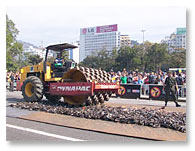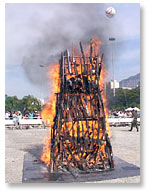|
Over Four Thousand Small Arms
Destroyed on Eve of UN Conference by Sam Logan Rio de Janeiro, Brazil
"Gun destructions like the one yesterday in Rio are an example to the world on the importance of civil society and government partnerships to reduce violence. Public gun destructions ensure that illegal weapons do not return to the streets where they could again be used to threaten, kill or maim others," said International Action Network on Small Arms (IANSA) MERCOSUR Coordinator Jessica Galeria from the UN conference in New York. The SALW destroyed in Rio were selected from a pool of weapons confiscated by authorities between 1997 and 1998, according to Rio daily, O Globo. Rio de Janeiro state authorities have a stockpile of 42,972 SALW, many of which contributed to the 87,172 deaths caused by firearms between 1991 and May of 2003. Yet while the weapon destruction here is a step toward disarmament in Rio, SALW disarmament is still not a top agenda item for most MERCOSUR politicians. According to Viva Rio small arms senior researcher Pablo Dreyfus, problems with the traffic of SALW in Rio and the MERCOSUR region stem from four contributing factors: poor implementation of small arms control legislation, little to no communication between civilian or police small arms control agencies and the military, corruption, and the poor regulation of the local arms production market. "Brazil has laws to regulate the production, sale, and use of small arms, but corruption and a lack of communication between the Army and civilian firearm control agencies equally contribute to poor policy implementation, law enforcement and SALW control," Dreyfus said. Viva Rio's senior small arms researcher provided a hypothetical case that, in his opinion, accurately exemplifies poor communication between government agencies . For example, private Brazilian arms producer Taurus produces 1,000 weapons for export to Paraguay. The Brazilian Army, which controls production, internal sale and export, oversees the sale of these weapons to Paraguay, a state known for its busy black market. But the Army doesn't communicate the information about the sale to Brazil's Federal Police, responsible for the enforcement of small arms in Brazil. So only after the Federal Police confiscate some of the same weapons from drug gangs in Rio de Janeiro, do they find out the arms were made and legally exported by Brazil. "Those who control the supply of SALW, such as the Ministry of Defense, do not communicate with those who control the demand and use of SALW in society, such as the Federal Police [within the Ministry of Justice]," Dreyfus argued. In some cases, the database that holds crucial information on the production and sale of small arms is simply not available to the law enforcers who fight the violent crime caused by the same weapons. Dreyfus explained that while small arms like pistols and revolvers wind up in the hands of small time criminals, military assault weapons, such as the AK-47, M-16 and FAL, are sold to drug traffickers due to poor regulation and control of surplus military weaponry. In countries like Argentina and Brazil, selling into the illegal market surplus and stockpiled military weaponry is a very tempting and easy way to make money. The case of former Argentine president, Carlos Menem, who allegedly sold arms to Ecuador and Croatia in the mid-nineties, is perhaps the most publicized example here. The control of SALW is not a top agenda item in most MERCOSUR countries, except one. "Brazil is the only MERCOSUR country where there exists a consensus between civil society and government concerning the dangers associated with the proliferation of small arms and light weapons," Dreyfus said. Yesterday's gun destruction in Rio de Janeiro is a good example. Dreyfus traveled to New York, where he joined Jessica Galeria and other members of Viva Rio, who continue to inform state delegates of the seriousness of this international problem. One that, according to Viva Rio, contributes to at least 35,000 deaths a year in Brazil and some 500,000 deaths a year, roughly one every minute, world-wide. MERCOSUR is a political and trade agreement negotiated from 1985 to 1991 between four member countries - Brazil, Argentina, Paraguay and Uruguay - and two associate members - Bolivia and Chile. Under the MERCOSUR agreement, member countries agreed to alleviate trade and political barriers within the group. Most recently, the block has proven helpful with negotiation of international trade agreements. Chile's consistent push in the nineties to enter the NAFTA agreement soured ties with other MERCOSUR countries, and the recent implosion of Argentina's economy dealt a nearly fatal blow to regional trade. Now, under the leadership of presidents Luiz Igácio Lula da Silva and Nestor Kirschner, Brazil and Argentina have agreed to reinvigorate trade within MERCOSUR's membership borders. Under new leadership, South America's two heavy weights plan to form a trade block with the Andean Trade Pact - Colombia, Peru, Bolivia and Ecuador - to leverage their position in Free Trade of the Americas (FTAA) negotiations with the United States. Yet many are doubtful FTAA will come into force by the January 2006 date set by regional trade officials. Also see: About the author: Sam Logan is a freelance journalist living and working in Rio de Janeiro. As an American with over five years of life and experience in Latin America, Sam covers human security and social development stories in South America. He speaks English, Spanish and Portuguese and has lived in Costa Rica, Mexico, Panama, Chile, and Brazil since 1998. Sam is from New Orleans, and is currently completing a Masters in International Policy Studies with the Monterey Institute of International Studies in Monterey, California. |
||||||||||||||||||||||||||||||||||
|
Published in In Motion Magazine August 6, 2003
|
||||||||||||||||||||||||||||||||||
If you have any thoughts on this or would like to contribute to an ongoing discussion in the  What is New? || Affirmative Action || Art Changes || Autonomy: Chiapas - California || Community Images || Education Rights || E-mail, Opinions and Discussion || En español || Essays from Ireland || Global Eyes || Healthcare || Human Rights/Civil Rights || Piri Thomas || Photo of the Week || QA: Interviews || Region || Rural America || Search || Donate || To be notified of new articles || Survey || In Motion Magazine's Store || In Motion Magazine Staff || In Unity Book of Photos || Links Around The World NPC Productions Copyright © 1995-2018 NPC Productions as a compilation. All Rights Reserved. |
||||||||||||||||||||||||||||||||||



